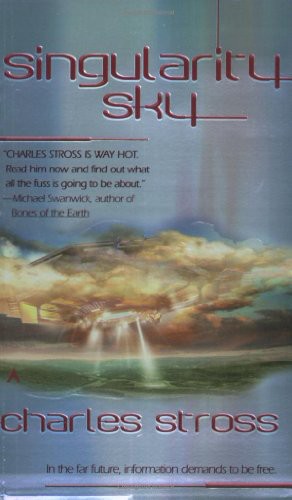
Singularity Sky PDF
Preview Singularity Sky
In his first novel, British author Stross, one of the hottest short-story writers in the field, serves up an energetic and sometimes satiric mix of cutting-edge nanotechnology, old-fashioned space opera and leftist political commentary reminiscent of Ken MacLeod. Spaceship engineer Martin Springfield and U.N. diplomat Rachel Mansour hail from an Earth that has gone through the Singularity, an accelerated technological and social evolution far beyond anything we can imagine. The Singularity was triggered by the Eschaton, a super-powerful being descended from humanity that can travel in time and that essentially rules the universe. Springfield and Mansour meet on the home world of the New Republic, a repressive, backwater society that has outlawed virtually all advanced technology other than that necessary for interstellar warfare. When one of the New Republic's colonial worlds is besieged by the Festival, an enigmatic alien intelligence, the Republic counterattacks, using time travel in an attempt to put its warships in position to catch the Festival by surprise. Springfield and Mansour, working for different masters, have both been assigned the task of either diffusing the crisis or sabotaging the New Republic's warfleet, no matter what the cost. As a newcomer to long fiction, Stross has some problems with pacing, but the book still generates plenty of excitement.
Copyright 2003 Reed Business Information, Inc.
In the twenty-fifth century, human society has depended for several hundred years on faster-than-light travel and an artificial intelligence called the Eschaton. Interstellar colonies are scattered all over, and one, the New Republic, has become a classic refuge for antitechnological holdouts. But the New Republic is suddenly under attack, literally, by the technology it has tried to suppress, which now appears under the name the Festival. An Earth battle fleet is on the way, but is it coming to help, to ride to power on the coattails of the Festival, or to fulfill some entirely separate agenda, possibly set by the Eschaton, which has achieved consciousness, sentience, and probably a lust for power? If no element of Stross' novel is very original, all of them are formidably well-executed, especially the meticulous and imaginative portrayal of the New Republic and its Victorian technology. In addition, the book possesses the rare virtue of neither requiring nor precluding a sequel. Roland Green
Copyright © American Library Association. All rights reserved
